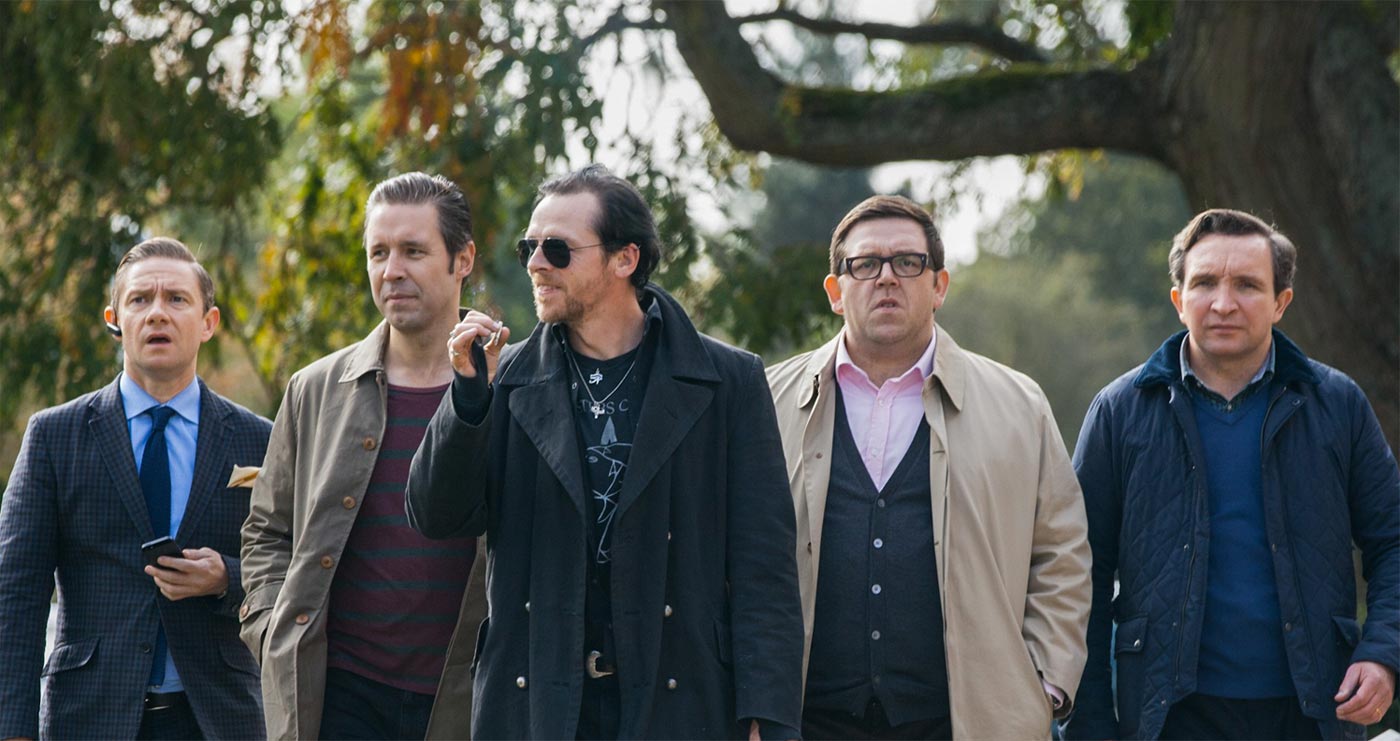Title: The World’s End
Directed by: Edgar Wright
Starring: Simon Pegg, Nick Frost, Martin Freeman, Pierce Brosnan, Rosamund Pike, Bill Nighy
Edgar Wright’s third film in his Cornetto-flavored trilogy, entitled “The World’s End”, is a fitting and suitable finale to a comedic run of nostalgia and geeky humor that’s as varied and flavorful as the dessert itself. Simon Pegg and Nick Frost are once again the centerpieces of Wright’s film, who portray vastly different characters than before and provide the story with a strong emotional core than before. Pegg (who co-wrote the film) in particular seems like Edgar Wright’s muse, while Nick Frost is the ever reliable sidekick (though he’s in no way secondary) of sorts. Wright’s Cornetto Trilogy is statement enough for his loving and confident direction; in particular, his energetic cinematography coupled with his perfectly timed comedic wit. “The World’s End” is a proper climax, that’s in equal parts a wry, hilarious love-letter to classic British science-fiction and a unique view on maturity and the value of moving forwards, not backwards.
“The King Returns” is his mantra and a reminder of his rambunctious, party-driven youth. But that’s just the problem: it’s in the past, in his youth where it’ll remain; he only wishes it was “returning”. Gary King is that guy, the one we’ve probably all met at some point or another, who seems to be fueled by past glories (for some, it’s the game winning touchdown, or others, it’s becoming valedictorian in high school). King is now, unfortunately, a 40-year old something that lives in a small apartment and barely makes ends meet. Through no coincidence, he also wears the exact same trenchcoat and black Sisters of Mercy t-shirt, a physical reminder of his goth phase in high school. His friends, however, have moved on and now have careers (though they hardly seem complacent). We first meet Gary in a circle, regailing others about his attempt to accomplish the much coveted “Golden Mile”, a pub crawl that ends in the titular and aptly named bar “The World’s End”.
Gary King has somehow weaseled his way into his friends’ lives and convinced them of the importance of completing the sacred “Golden Mile” and returning to the small town that birthed them. But his toughest task thus far as been recruiting Andrew Knightley (Nick Frost), whose friendship he lost long ago in an accident. In these opening sequences, Wright’s cinematic style is particularly noteworthy: the zooms, the rapid-fire editing, close-ups of beverages being refilled and chores being completed. In “The World’s End”, he moves his style further, involving 16mm film in the opening flashback sequences of King and his cohorts’ youthful exuberance in all of their montage driven glory. It’s certainly a departure from what he’s done before, even though the heavily stylized nature of his direction is very much intact.
During their return home, “The Five Musketeers” discover that the town has changed dramatically, while it still remains the same. All of the pubs that were once included in the “Golden Mile” are identical “pub chains” with the same beer on tap. This is unwelcome, for good reason, but it doesn’t deter the crew. They begin to notice that the town is acting peculiarly, only to come to the conclusion (in a wild bathroom fight that King instigates) that the population has been overtaken by robots “filled with blue stuff”. This is made evident by the detachment of limbs and varying decapitations in many chaotic fight sequences. Here, Frost, does some of his best “slapstick-fighting” by bodyslamming and ripping arms and legs off only to bludgeon each robot with their now missing appendage.
Though it’s hardly perfect, with surrounding characters emitting dull grey personalities with expendable roles, and an ending that stretches itself a little too thin, “The World’s End” is an applaudable end to a trilogy that, truthfully, never felt like much of one, but the disparate elements of each form a thematic whole that’s more than satisfactory. There are several moments of pure adrenaline and one revelation in the climax that’s as emotional as any in the trilogy, if not the most gut-punching.”The World’s End” is a well-rounded and solid end to “The Cornetto Trilogy”.
Technical: B+
Acting: B
Story: B
Overall: B

